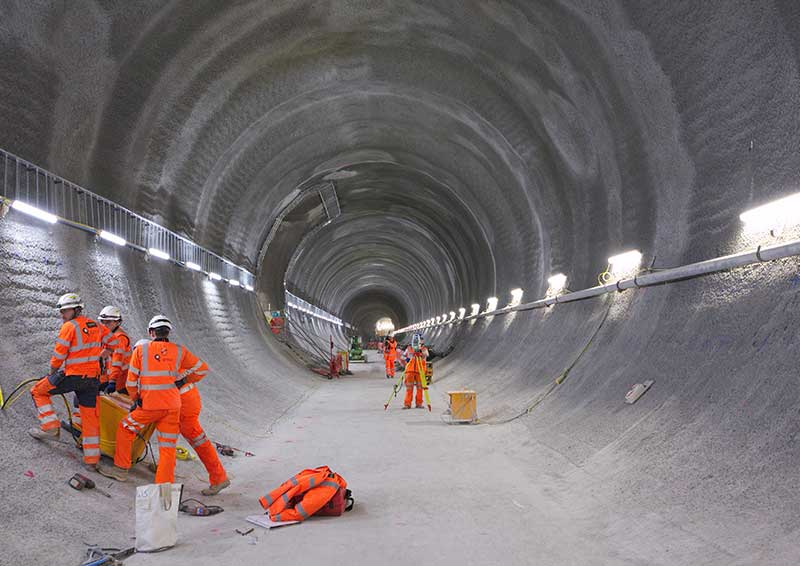Five reasons why civil engineering is the best career

|
| Whether you are thinking about going into civil engineering or you are already working in the industry, these are the reasons why civil engineering is, without a doubt, the greatest job in the world...says the Institution of Civil Engineers (ICE). |
[edit] Introduction
One thing that civil engineers seem to have in common is an innate love for their job.
They seem to all have such a high level of job satisfaction from their work, which not only gets them out of bed every morning but motivates them in their day-to-day activities.
The ICE asked some civil engineers what they love about the profession, and why they believe it is the king of careers.
[edit] 1. Civil engineering is so varied
Civil engineering is a term that covers so many job roles, sectors, skills and people.
“There’s more to it than muddy boots and concrete,” says Blessing Danha.
She finds the application of big data and technology on aging infrastructure an interesting area of work.
Every day is different, according to Aaron Matthew. “You get to work with a ton of new people on new tasks every day. I have written legal documents, made announcements on the trains, repaired Santander bikes and explored underground stations,” he says.
Meanwhile, Tara Fraser’s civil engineering career has included abseiling off bridges and mast structures, inspecting Ministry of Defence facilities, and working on airports and laboratories.
“There’s so much variety,” says Fraser. “Where else can you be working inside an office and out on site, all in the same day?”
[edit] 2. Civil engineering is a creative career
If you think that creativity can only be found in an arts career, you would be wrong.
The vast number of different designs for buildings, bridges and other structures shows how civil engineers have to think outside the box to solve a wide range of challenges.
“I had no idea how creative civil engineering was until I got to university and my first project was to build a pasta bridge,” says Cat Salvini.
“It’s creative. Whether it’s bringing a drawing on paper to life, to working out how to thread a tunnel through the congested ground below the feet of Londoners,” adds Sakthy Selvakumaran.
[edit] 3. Civil engineering is a real team effort
Engineers work in teams to solve real-world problems, so if you are a team player, it is the perfect career for you.
“The civil engineering industry is built on team spirit and collaboration,” says Kishore Ramdeen.
“We encourage each other to achieve more and challenge ourselves. And when we work together well, we get things done safer, faster and cheaper.”
Natalie Cheung is one civil engineer who is motivated by working with other people.
“It’s great to come together with people with different expertise to deliver one collaborative design,” she says.
“A civil engineer isn’t just a person who sits behind a PC doing calculations or designing all day, but a person who forges relationships, motivates others and talks openly about worldly issues,” adds Ashkan Amiri.
[edit] 4. Civil engineering takes you around the world
Many people want jobs that involve travel, and if you are a civil engineer, you have hit the jackpot.
“I knew before that you could move to a different country to work,” says Bianca Wheeler. “But never quite understood the large scale of opportunities and project roles that exist in the civil engineering industry.”
And it is not all work and no play.
“You get to work with a diverse range of people from all over the world, and before you know it, you have a contact list of international friends that can offer you technical engineering advice, but also help you plan your next holiday if you plan to visit their home country,” says Ramdeen.
[edit] 5. Civil engineering makes a tangible difference to people’s lives
This has to be the number one reason why civil engineers believe their chosen career is the best. Many of the projects they work on are for the benefit of the general public and local communities.
“You’ll make a huge, positive difference to the world,” says David Waboso.
Major Rob Ridley agrees: “There are as many different types of engineer as you can imagine, but they’re all solving people’s problems. From ensuring the basics, like plenty of clean water in our taps to designing and building the places we live, work and play in, all over the world.”
With sustainability high on everyone’s agenda, Ashkan Amiri points out how civil engineering is the “most active way to help the environment, with a constant push to be more sustainable and to think of solutions to climate issues, to then building those solutions”.
“Most structures today are designed to last more than 100 years,” says Emma Watkins.
“Knowing that I’ve helped build something that my children and grandchildren may use is a real source of pride for me.”
[edit] About this article
This article was written by Anh Nguyen, ICE Digital Content Editor. It was previously published on the website of the Institution of Civil Engineers (ICE) and can be accessed HERE.
More articles by ICE on Designing Buildings Wiki can be found HERE.
[edit] Related articles on Designing Buildings Wiki
- 7 myths about a career in civil engineering.
- Appointing consultants.
- Architect.
- Bridge construction.
- Building design process.
- Building services engineer.
- Capability Brown - proof that engineering for sustainability works.
- Consultant team.
- Designers.
- Engineer.
- Engineering Council.
- Forensic investigations: can we trust them?
- Geotechnical engineering.
- How to become a civil engineer.
- Institution of Civil Engineers.
- Institution of Structural Engineers.
- Lead consultant.
- Lead designer.
- Section engineer.
- Site engineer.
- Structure definition.
- Structural engineer.
- Water engineer.
Featured articles and news
Licensing construction in the UK
As the latest report and proposal to licence builders reaches Parliament.
Building Safety Alliance golden thread guidance
Extensive excel checklist of information with guidance document freely accessible.
Fair Payment Code and other payment initiatives
For fair and late payments, need to work together to add value.
Pre-planning delivery programmes and delay penalties
Proposed for housebuilders in government reform: Speeding Up Build Out.
High street health: converting a building for healthcare uses
The benefits of health centres acting as new anchor sites in the high street.
The Remarkable Pinwill Sisters: from ‘lady woodcarvers’ to professionals. Book review.
Skills gap and investment returns on apprenticeships
ECA welcomes new reports from JTL Training and The Electrotechnical Skills Partnership.
Committee report criticises UK retrofit schemes
CIOB responds to UK’s Energy Security and Net Zero Committee report.
Design and construction industry podcasts
Professional development, practice, the pandemic, platforms and podcasts. Have we missed anything?
C20 Society; Buildings at Risk List 2025
10 more buildings published with updates on the past decade of buildings featured.
Boiler Upgrade Scheme and certifications consultation
Summary of government consultation, closing 11 June 2025.
Deputy editor of AT, Tim Fraser, discusses the newly formed society with its current chair, Chris Halligan MCIAT.
Barratt Lo-E passivhaus standard homes planned enmasse
With an initial 728 Lo-E homes across two sites and many more planned for the future.
Government urged to uphold Warm Homes commitment
ECA and industry bodies write to Government concerning its 13.2 billion Warm Homes manifesto commitment.
From project managers to rising stars, sustainability pioneers and more.
Places of Worship in Britain and Ireland, 1929-1990. Book review.
The emancipation of women in art.

























Comments